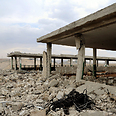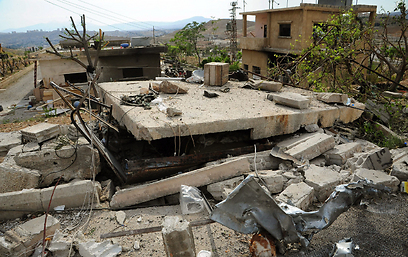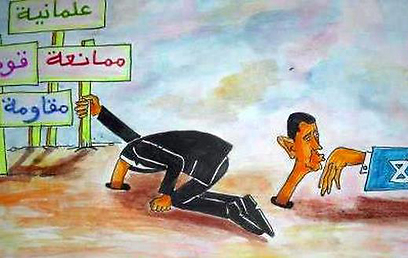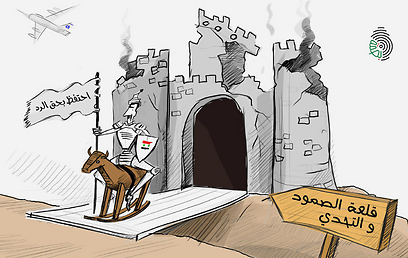
Syrians angry at Israel, say Jewish state clearly behind recent airstrikes
Talk on streets places responsibility for bombings squarely on Israel, mixed feelings abound toward age-old 'enemy'
“First the foreign jihadists hijack the revolution and now the Israelis,” the 31-year-old electrician complained to The Media Line. “Why can’t they leave Syria to Syrians?”
Related stories:
- Assad: Syrian people, army capable of dealing with Israel
- Golan Druze divided, afraid over Syria
- Syrian official: We won't respond immediately to Israeli 'aggression'
While Israel has neither confirmed nor denied it was behind the attacks on Syrian military installations this week, Syrians had no doubt who was responsible. What they’re not sure about, is what it will mean for the future of the civil war in Syria.

Site of alleged Israeli strike near Damascus (Photo: EPA)
On one hand, many are happy to see the regime they are fighting suffer a blow to its esteem. At the same time, Syrians fear the attack could allow President Bashar Assad to marshal support by depicting an imminent Zionist threat.
Syrians are taught to loathe Israel at an early age, learning that it is the Arabs’ mortal enemy which wants to steal all their land and strip them of their cultural heritage. Daily doses of propaganda in papers and television ensure that older generations do not forget the perils Syria faces from what they call an expansionist Israel.
But today, many Syrians in opposition controlled areas have reconsidered their passionately held views about their southern neighbor. Some believe that Israel and the Syrian government are closet allies.
“Why hasn’t Syria attacked Israel in the last thirty years?,” 19-year-old Hamid Shadi asked The Media Line at an Aleppo bakery. “How can Syria be Israel’s fiercest enemy if it never fights it?”
Shadi and others believe the two nations are colluding to prevent a rebel victory and that Israel has persuaded its Western allies not to intervene in the conflict.
Such reasoning has led some Syrians to postulate that the Israeli attacks were a ruse to allow the regime to shore up its sinking support in the face of the rebel led Free Syrian Army’s (FSA) revolution.

Arab editorial: Assad holding resistance sign while kissing Israel's hand
“Just when the regime is beginning to lose on the battlefield Israel attacks,” 34-year-old accountant Sa’id Bunni tells The Media Line. “And what did it hit? A science research facility. How is that a military target?”
More level headed Syrians were equally perturbed by the attack. “It will only distract people from our cause,” complained 42-year-old landlord Jabir Shufi. “We need to focus on overthrowing the regime, not sideshows and circuses.”
Shufi and others worry that a regime skilled in turning catastrophes to its advantage will do just that with the Israeli bombings. “It will make people reconsider who the real enemy is – the Zionists or the regime, the defenders of the Arab cause,” explained 46-year-old Anwar Ma’ri.” Syrians will just get confused. And they are good at that.”

Arab editorial: Assad riding a wooden horse, holding sign reading: "Retain the right of response"
Such confusion has already afflicted a number of Syrians. “Why is the FSA fighting the only regime willing to stand up to Israel?” asked 25-year-old office supply store clerk Muhammad Sabri. “It should support (President Bashar) Assad in his battle instead of fighting him.”
It is a refrain many on Aleppo’s streets echo. “The FSA is helping the Zionists bleed Syria,” said 22-year-old fruit vendor Hashim Sadiq. “This brings us dishonor.”
Despite the close ties between Israel and the United States, few here believe Jerusalem attacked on Washington’s orders. “(American President Barack) Obama doesn’t need little Israel to do his bidding,” exclaimed 31-year-old builder Yasir Umar.
In private homes far from the fears of eavesdroppers, some Syrians expressed reserved approbation. “Assad does not fear the FSA,” said a man who only asked to be identified as Abu Ahmad. “But Israel scares him. These attacks keep him up at night and distract him from the fight against the FSA.”
Others who endorsed the Israeli strike lamented that Jerusalem did not bomb anything of significance. “They didn’t take out Assad’s planes,” noted a man who asked that his name be withheld because he was speaking about a sensitive topic. “They did not destroy his tanks. So what good is the attack?”
With so many opinions voiced about an attack whose target is shrouded in secrecy, Syrians are unsure of what to think. And that just might play into the hands of a regime that has portrayed itself as the only side that can provide stability in a land inundated with uncertainty.
Article written by Michel Stors
Reprinted with permission from The Media Line
- Receive Ynetnews updates directly to your desktop










